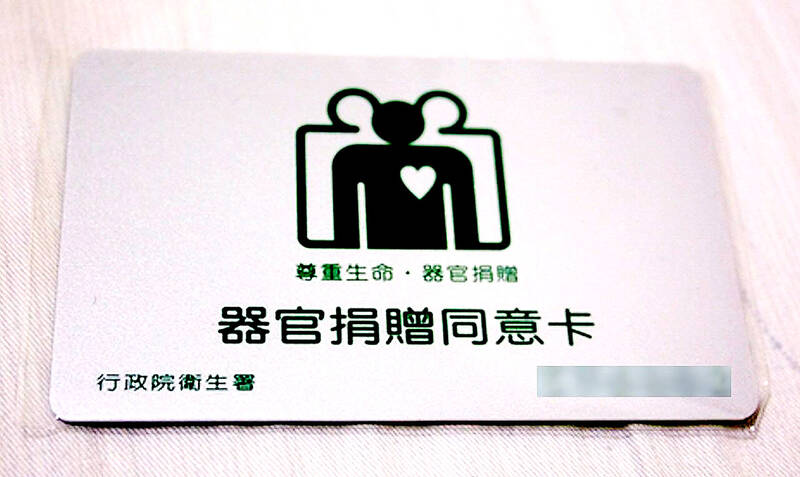Taiwan has seen significant growth in the number of organ donors and organ transplants performed over the past decade, but there are still more than 10,000 people waiting for transplants, according to data from the Taiwan Organ Sharing Registry and Patient Autonomy Promotion Center.
The center’s data showed a total of 10,171 people received organ transplants, including issue transplants, between 2015 and the end of last month.
A total of 2,165 people received organ transplants in 2023 and last year, a 30 percent increase from 2015 to 2016, when 1,642 people received transplants, the center said.

Photo courtesy of Taiwan Medical Alliance for Labor Justice
However, like most countries, Taiwan is facing a serious organ shortage, it said.
Of the more than 10,000 people waiting for organ transplants, 78.5 percent are waiting for a kidney transplant, 8.8 percent for cornea transplants and 7.9 percent for a liver transplant, the center said.
At a news conference on Saturday, ahead of the 10th anniversary on Thursday of Organ Donation Memorial Day designated by the Ministry of Health and Welfare, center chairman Lee Ming-che (李明哲) said it is very difficult for family members to make decisions for their relatives regarding organ donation.
Most potential organ donors have sustained serious injuries from sudden events, such as car crashes, he said.
This leaves them unable to express their willingness to donate, and so the decision falls to their families, who are caught off guard by the sudden trauma, he said.
It makes a difference when people declare their intent to donate organs while conscious, he said.
This is the reason for the Patient Right to Autonomy Act (病人自主權利法), and why more people have been signing palliative care consent forms in recent years, he said.
Only 600,000 to 650,000 people have consented to be organ donors in Taiwan, fewer than 3 percent of the population, the center said.
In addition, the number of potential organ donors who go on to donate organs is fewer than 20 percent, it said.
Under the current opt-in donation system, medical personnel must communicate with family members, but time constraints and emotional stress affect organ donation rates, it said.
It is not the legal framework that is most important, but public education and the design of the system that really matters, Lee said.
Some European countries have an opt-out donation system, where consent is assumed, but families’ wishes are still respected, and organs are not forcibly taken, Lee said.
While the US has an opt-in system, where people have to register their consent, it has become a global leader in organ donation thanks to early education, asking people to register consent on their driver’s license and a well-developed transplant network, he said.
Taiwan’s system is similar to the US’, as it also has a national organ allocation center and digitized system, but the key is deepening public understanding and support for organ donation, he added.
“Making organ donation a choice familiar to everyone is the fundamental way to promote it,” Lee said.
In April last year, the ministry enabled people to sign the advance medical directive to donate organs via their National Health Insurance cards.
The number of Taiwanese signing the directive has increased six fold from 1,254 people in April last year to 7,897 in March, the center said.
Lee encouraged people to discuss this issue with their families early on and record their wishes, so that family members could make informed decisions at crucial moments.

The Coast Guard Administration (CGA) yesterday said it had deployed patrol vessels to expel a China Coast Guard ship and a Chinese fishing boat near Pratas Island (Dongsha Island, 東沙群島) in the South China Sea. The China Coast Guard vessel was 28 nautical miles (52km) northeast of Pratas at 6:15am on Thursday, approaching the island’s restricted waters, which extend 24 nautical miles from its shoreline, the CGA’s Dongsha-Nansha Branch said in a statement. The Tainan, a 2,000-tonne cutter, was deployed by the CGA to shadow the Chinese ship, which left the area at 2:39pm on Friday, the statement said. At 6:31pm on Friday,

The Chinese People’s Liberation Army Navy’s (PLAN) third aircraft carrier, the Fujian, would pose a steep challenge to Taiwan’s ability to defend itself against a full-scale invasion, a defense expert said yesterday. Institute of National Defense and Security Research analyst Chieh Chung (揭仲) made the comment hours after the PLAN confirmed the carrier recently passed through the Taiwan Strait to conduct “scientific research tests and training missions” in the South China Sea. China has two carriers in operation — the Liaoning and the Shandong — with the Fujian undergoing sea trials. Although the PLAN needs time to train the Fujian’s air wing and

Taiwanese celebrities Hank Chen (陳漢典) and Lulu Huang (黃路梓茵) announced yesterday that they are planning to marry. Huang announced and posted photos of their engagement to her social media pages yesterday morning, joking that the pair were not just doing marketing for a new show, but “really getting married.” “We’ve decided to spend all of our future happy and hilarious moments together,” she wrote. The announcement, which was later confirmed by the talent agency they share, appeared to come as a surprise even to those around them, with veteran TV host Jacky Wu (吳宗憲) saying he was “totally taken aback” by the news. Huang,

The American Institute in Taiwan (AIT) put Taiwan in danger, Ma Ying-jeou Foundation director Hsiao Hsu-tsen (蕭旭岑) said yesterday, hours after the de facto US embassy said that Beijing had misinterpreted World War II-era documents to isolate Taiwan. The AIT’s comments harmed the Republic of China’s (ROC) national interests and contradicted a part of the “six assurances” stipulating that the US would not change its official position on Taiwan’s sovereignty, Hsiao said. The “six assurances,” which were given by then-US president Ronald Reagan to Taiwan in 1982, say that Washington would not set a date for ending arm sales to Taiwan, consult